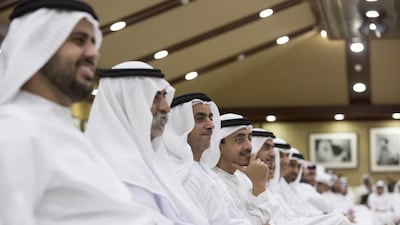ABU DHABI // The New York Times bestselling author Dan Buettner's secrets to a long and healthy life transfixed the audience, which included members of the Royal Family, at the fifth Sheikh Mohammed bin Zayed Ramadan Majlis on Wednesday night.
Buettner provided some surprising revelations in his tips on how to live a grand life to the age of 100 in his talk Blue Zones: Secrets of a Healthy Life.
The author has spent more than a decade studying populations with unusually long lifespans.
“If lifestyle, habits and environment account for 80 per cent of our longevity, we wanted to find out where there were pockets of people who were doing it right,” he said.
“Through funding with National Geographic, we hired the best demographers to look at the data and found the five geographic locations where populations live exceptionally long.”
The goal, he said was that “if we can find the optimal lifestyle and environments for longevity, we would have the de facto formula for longevity”.
The communities of longevity, Blue Zones, can be found in Okinawa, Japan; Ikaria, Greece, Sardinia, Italy, the Nicoya peninsula of Costa Rica, and Loma Linda, California. The centenarians there lived full lives until the end.
“If we are able to mimic or set up our own lifestyles and environments like these Blue Zone cultures, we can create healthier places to work, play and live,” Buettner said.
Though “to reach the age of 100, no matter how much access you have to health care, you have to win the genetic lottery”, he admitted.
That does not stop people trying and there are controllable factors in having the good life he said. “Remarkably, we see the same characteristics among the world’s longest-lived people no matter where you go,” he said.
Though those factors may not be what you think. Rigorous exercise, for example, seen by many cultures to be the ticket to a long life, is not how they do it in the Blue Zones.
They do not run marathons or do hot yoga, Buettner said. They move naturally, spending their days walking, gardening and, maybe, chopping wood. Other factors to longevity include taking time to de-stress, be it meditating, napping, or spending time outdoors.
Long lifers also tend to eat small meals, almost none of which consist of processed food. They also tend never to find their eyes bigger than their stomach – finishing meals when they are about 80 per cent full.
“The longest-living Americans are pescetarians,” Buettner said, adding that long lifers’ diets consist mostly of vegetables, grains and fruits.
However, they are not entirely without meat, typically eating it about three times a month, mostly during holidays and for celebrations.
People in Blue Zones also have a strong sense of belonging, the author said, and are big socialisers – tending to stick to real-life interactions as opposed to those via social media and text.
Religion is also important to people who tend to live long lifes.
The audience also heard that people in Blue Zones usually keep their parents close by, have healthy relationships and are nurturing towards children.
Spending time with family and close friends, Buetnner said, especially across generations, contributed to health, longevity and success of all family members.
“As you can see, there is no one answer for improving health and well-being but this systematic model focuses on the most important aspects of the environment so the healthy choice just naturally ensues,” he said.
“It’s the culmination of small changes that over time make the biggest impact on health.”
Although the foolproof secret to living a long life was not revealed to the audience, the majlis may have increased their lifespan ever so slightly.
Rituals like these, the author said, were an example of what supported longevity.
The lecture was attended by members of the royal family including Sheikh Abdullah bin Zayed, the Foreign Minister, Sheikh Saif bin Zayed, Deputy Prime Minister and Minister of Interior, Sheikh Nahyan bin Mubarak, Minister of Culture, Youth and Community Development, and other sheikhs, ministers, ambassadors and members of the media.
nalremeithi@thenational.ae

